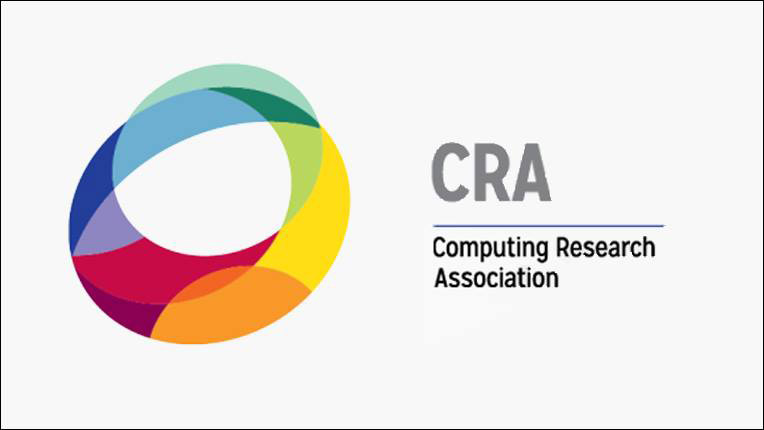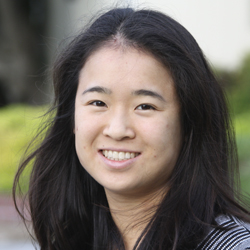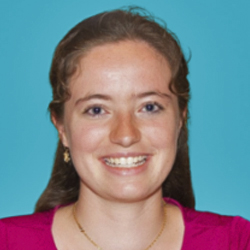Harvey Mudd Seniors Honored for Computing Research
March 2, 2023
Harvey Mudd College computer science majors Cynthia Hom ’23 and Malia Morgan ’23 received honorable mentions in the Computing Research Association (CRA) 2023 Outstanding Undergraduate Researcher Awards.
The nationwide award program recognizes undergraduate students in North American colleges and universities who show outstanding research potential in an area of computing research. Nominated students made significant contributions to more than one research project; authored multiple papers; presented at major conferences; produced software, applications, or algorithms; participated in summer research or internships; served as teaching assistants, tutors, or mentors; or volunteered in community efforts.
Cynthia Hom ’23
Adviser: George Montañez

How did you become interested in your research area?
I’ve always loved solving puzzles. I’d solve Sudoku puzzles on the airplane with my mom and would always have a mind games book with me for long car drives. Then, in high school, I also started to gain an interest in machine learning. During freshman spring, I took discrete math with Prof. Michael Orrison, and thoroughly enjoyed coming up with ideas for the proofs—they’re just like puzzles! Thus, when I was looking for something interesting to do in the summer after my freshman year, AMISTAD lab was my top choice. Professor George Montañez’s AMISTAD lab is all about theoretical machine learning research, so it’s been the perfect place for me to combine my love for solving puzzles and coming up with proofs with my interest in machine learning and artificial intelligence.
Describe your research and who you’re working with.
Throughout my time in the AMISTAD lab, I’ve worked on several projects—analyzing the survival advantages of intention perception in virtual agent games, synthesizing results for an algorithmic search framework that unifies machine learning and artificial intelligence algorithms, and my current project, proving a bound that allows us to use a statistical hypothesis test with estimated quantities. I’ve used a two-distribution hypothesis test for the intention perception algorithm in my first project at AMISTAD, and I’m working with William Yik ’24, whose prior work used this hypothesis test to detect bias in datasets. We’ve both used the hypothesis test for different applications in the past, so our experiences complement each other well, and we make a great team!
Other HMC Activities?
I’ve grutored for several classes (CS 70, CS 140) and am currently a grutor for computer systems (CS 105). I’m also member of SWE (Society of Women Engineers). I’m also a co-captain of Claremont Colleges Club Tennis, of which I’ve been an active member for all four years. As a co-captain, we help give everyone a chance to play tennis by providing extra rackets for students to borrow and also bring our tournament team to compete against other club tennis teams throughout Southern California.
Malia Morgan ’23

Advisers: Zach Dodds, James Boerkoel, Calden Wloka
How did you become interested in your research area?
After taking CS 5, I became interested in how computer science is taught, and ended up working in Professor Dodds’ lab the summer after my freshman year. I was introduced to the broader question of human computer interaction. I am fascinated by the way that humans and computers interact, and the impact that those interactions have on the way that we live. It’s a big, constantly shifting question without a full answer. I have been in three different labs at Mudd, including work on educational computer science, human-robot teams, and computer vision design. Each has shown me a different facet of this question.
Describe your research and who you’re working with.
My freshman summer, I worked with Professor Zach Dodds to help redesign an introductory computer science class for non-computer science majors and do data analysis and visualization work on over 10 years of educational data.
My sophomore summer and junior year, I worked in Professor Boerkoel’s HEATlab (Human Experience & Agent Teamwork), whose mission is to create better and more flexible human-robot teams. Two other undergraduate students and I worked on a foundation that a previous group had established to redefine the role of humans in planning problems. Often, humans are treated as uncontrollable agents in these problems, who could complete their tasks anytime. We argued—and created a mathematical proof and algorithm for—a different interpretation, where humans are random but rational and operate under certain constraints, like not starting a task until the previous one is complete. Our algorithm offers a way to redefine the role of humans on human-robot teams to make them more active members and create more flexible plans.
My junior summer and senior year, I have been working on a research project in Professor Calden Wloka’s Lab for CATS (Cognition and Attention in Time and Space). I came onto this project at the beginning and have spent most of my time working with a few other students to build a solid framework and codebase for further analysis. The ultimate goal of this project is to examine attention in action recognition neural network models and compare it to human attentional behavior. Human viewers outperform video action recognition systems, so knowing the differences in which part of the videos the humans and the models are watching could offer valuable information. Finding these deficits in the model’s behavior could allow us to modify it to behave more like a human observer and improve its performance. I am excited to see what comes up this year as I continue working on it!
Other HMC activities?
I grutor in the computer science department, including (over the past three years) for CS 5, CS 181Y, CS 81 and CS 153. I am also an Academic Excellence facilitator for the physics department, and work in the Office of Admission as a social media intern and tour guide. I have been a member of the Living Learning Community (a social justice educational student organization) for three years, including serving as co-president this year. We host at least eight educational events about various social justice topics open to the Mudd student community every semester and host weekly internal meetings.
